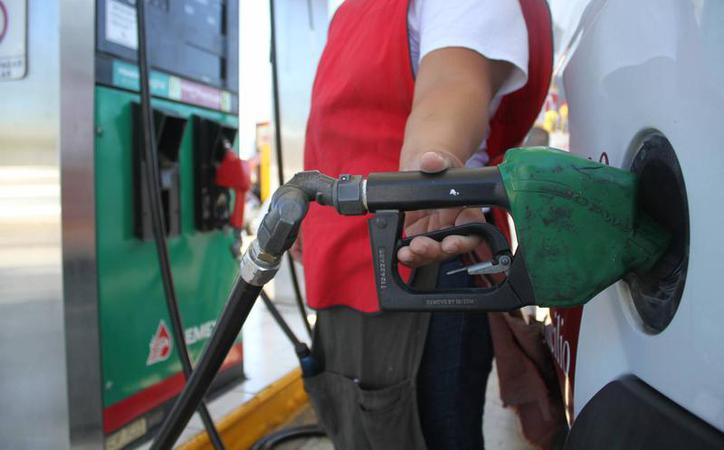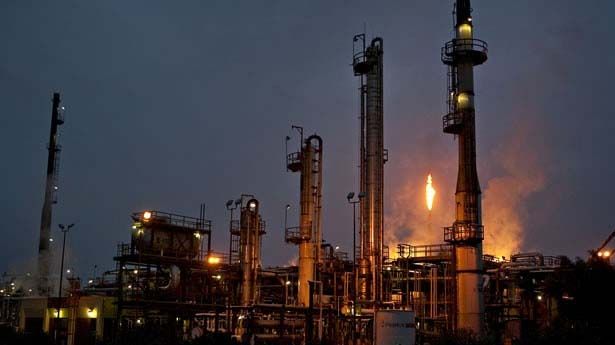López Obrador flirts with the communist regimes of Cuba and Venezuela days before the T-MEC comes into force. The Mexican president said he would sell gasoline to Venezuela despite U.S. sanctions.
MEXICO CITY (Infobae) – Days before the new trade agreement with the United States and Canada came into effect, President Andres Manuel Lopez Obrador gave a series of winks to the Cuban and Venezuelan regimes, which could compromise the “good relationship” he claims with Washington.
“We are free,” AMLO said Monday about the possibility of selling Venezuela gasoline for “humanitarian reasons,” despite the Trump administration’s sanctions against Maduro’s dictatorship.
In view of the deficit of Mexican doctors to attend to the high demand of people sick with the coronavirus, the federal government decided to hire Cuban doctors and nurses.

Last May, 585 health workers from the Caribbean island arrived in Mexico City, the epicenter of the pandemic in the country.
The recruitment was possible thanks to an agreement signed between the Institute of Health for Welfare (Insabi), the capital’s Ministry of Health and the Ministry of Administration and Finance, for the care of patients with coronavirus. Insabi allocated USD 6.2 million.
For its part, the Ministry of Foreign Affairs explained that Cuban doctors would not provide medical services to the population, and would only make public policy recommendations.
The work carried out by the Cuban specialists has been questioned by Mexican health professionals, who also expressed their indignation at the resources allocated, “by paying fees to foreign personnel in an unfair manner, paying them a higher salary than that received by a Mexican specialist in health institutions.

Through a letter sent to López Obrador, the Mexican medical staff assured that in the country “All general or specialist doctors have documents and certificates for our practice, regulations that are violated by the decree that allows medical staff without this certification to practice within the Mexican Republic,” is indicated in the document signed by Colleges, Associations, and Federations of specialist doctors.
Mexico willing to sell gasoline to Venezuela, despite possible sanctions from Washington
Last April, world oil prices fell to their lowest level in recent history after the dispute between Russia and Saudi Arabia to set the price and production quotas in the midst of the crisis caused by the COVID-19 pandemic, prompting the Organization of Petroleum Exporting Countries and Allies (OPEC+) to reach an agreement to reduce the production.
The Mexican government promised to reduce its production by 100,000 barrels per day, but OPEC demanded 400,000 barrels, which Mexico opposed, and even led Energy Secretary Rocio Nahale to leave the negotiating table.
That’s when the U.S. government stepped in to help its partner: Washington committed to further reduce its production by 250,000 barrels a day to help Mexico.
However, the government of Andrés Manuel López Obrador did not clarify the framework of this “aid” from the U.S. government; that is, in exchange for what.

Despite this precedent, this Monday, June 15, President Andres Manuel Lopez Obrador assured that he would be willing to sell gasoline and fuel to Venezuela for humanitarian reasons, even at the cost of strong sanctions imposed by Washington.
However, the Mexican president clarified that he has not received any request from the Venezuelan ruler, Nicolas Maduro.
“In the event that they make the request and it is a humanitarian need, we would do it,” he said.
Andrés Manuel López Obrador has insisted that Mexico is an independent country and claims to have an unbeatable relationship with Donald Trump.
“We are free, Mexico is an independent, sovereign country, we make our own decisions and we do not interfere with other countries’ policies. It is self-determination of peoples and helping in humanitarian matters. No one has the right to oppress others, no hegemony can crush any country,” AMLO said.
Although Venezuela is one of the countries with the largest oil reserves in the world, it does not have sufficient capacity to refine fuels and imports them. But the United States has imposed sanctions on countries that sell fuel to the South American nation.
Since the beginning of June, the Venezuelan government stopped subsidizing the price of gasoline, so Maduro announced that citizens will have to pay for the fuel sent by Iran at market price.
López Obrador has maintained a cordial relationship with Nicolás Maduro, so his administration has avoided speaking out against the Venezuelan government in various international forums and has called for a negotiated solution to the country’s political crisis.
Mexico imports 70% of the fuels sold in the country, and they come mainly from the United States. However, since the beginning of the López Obrador administration in December 2018, the Mexican president has promised energy self-sufficiency. To this end, it has decided to “strengthen” Petróleos Mexicanos, as well as the construction of the Dos Bocas refinery.
Mexico Accused of Regulatory Discrimination
The American Petroleum Institute (API) denounced that the Mexican government is carrying out a series of discriminatory and irregular practices in the delivery of permits by the Energy Regulatory Commission (CRE) to U.S. investors, violating Mexico’s commitments under both the U.S.-Mexico Trade Agreement and the Canada-Mexico Trade Agreement (T-MEC).

According to API’s letter, addressed to Mike Pompeo, U.S. Secretary of State; Wilbur Ross, U.S. Secretary of Commerce; Dan Brouillette, U.S. Secretary of Energy; and Robert Lighthizer, U.S. Trade Representative, there is a substantial concern that recent actions taken by the Lopez Obrador government will weaken the framework for continued trade flows and capital investment in energy among North American economies.
According to the agency, U.S. investors face increasing difficulties in obtaining permits for activities such as new or refurbished stations, third-party storage facilities, imported fuels, liquid terminals, and liquefied natural gas terminals.
That is why they requested the use of diplomatic channels to engage with President López Obrador and his cabinet-level counterparts, to urge the government to fulfill its T-MEC commitments.
“The T-MEC was developed to foster the relationship between the three nations and create a positive trade and investment environment for all parties involved,” said the API, the largest oil organization in the United States.



